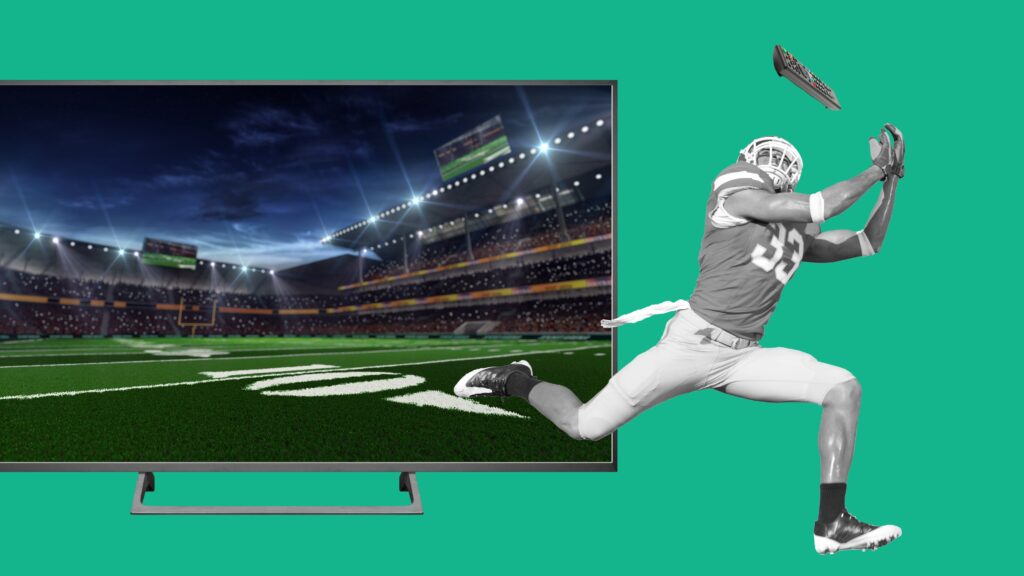Streaming Channels Look to Intercept NFL’s Sunday Ticket
Isabel Greenfield | 5 Min Read

Sports are the common reason TV viewers are hanging on to their cable subscriptions. Until recent years, it was near impossible to catch your favorite team live on streaming. As we’ve covered earlier, the landscape of sports media rights is changing and leagues continue to follow their audiences where they prefer to watch. While the NFL made early moves to sell Thursday Night Football distribution rights to Amazon way back in 2017, they aren’t done yet.
Sunday Ticket and Key Audiences are For Sale to the Highest Streaming Bidder
Last week’s announcement that NFL’s Sunday Ticket will likely be moving to a streaming service shouldn’t surprise those following the growth of Connected TV and the slow shift of sports to follow. Streaming content is famously on-demand compared to its linear counterpart, but as more people decide to cut the cord, everything from live events to sports and award shows are looking to find their place in the CTV universe.
Cable subscribers often cite sports as their reason for holding on to their expensive subscriptions. 44% of cable subscribers say that they would cancel their packages if they had access to live sports, according to a survey by Magnite. They may not need to wait much longer.
Sports leagues are taking note, making their services more accessible through services like Fubo TV, Hulu Live, or the aforementioned Thursday Night Football streaming on Amazon. And the popularity of sports is clear as it enters among the wealth of content available on streaming. Live sports already account for 30% of all CTV streaming.
The announcement that Sunday Ticket will be available through a streaming service continues to turn the tide for sports on streaming. Sunday Ticket has, to date, been a service available only through DirecTV, which allows sports fans to access games not available through their local sports channels. This shift will allow more access to the service, DirecTV not required.
Sunday Ticket Will Be a Touchdown for National Advertisers
As Forbes pointed out back in 2020, “The NFL is the most dominant property on TV, with 41 of the 50 most-watched telecasts in 2019, but cable subscribers continue to cut the cord, and the average NFL viewer is 52, according to Nielsen.” The shift to streaming will help the NFL recapture a younger audience, exciting news to advertisers looking to reach these key demographics.
The ripple effect of these moves is yet to be seen but will be sure to disrupt the TV business as we’ve known it. Upfronts, which are often negotiated around these key franchises, will be sure to feel the effects. While Disney would be able to incorporate Sunday Ticket into their hybridized upfronts, Amazon and Apple, two other likely contenders for the package, aren’t a part of the traditional upfronts and will most likely sell Sunday Ticket the way they do with other tentpole content.
Advertisers will benefit from this increased access to inventory within the highly sought-after games once they are released from the upfront commitments. Those with smaller budgets may also be able to purchase inventory where available, rather than losing out to the top advertisers who are able to secure inventory for the length of the season.
Local Advertisers Hope to Avoid the Fumbles of Cable and Regional Sports Networks
This shift will also impact local advertisers. Sports and their accompanying regional sports networks have long been a key space for local advertisers on linear. Geo-targeting is made easy within a channel already only available to that region.
Chicago sports teams recently made headlines. The White Sox, Bulls, and Blackhawks have concurrently ending contracts with NBC Sports Chicago and are reportedly in talks to start their own network. While this may be only a negotiation tactic, a new network could present interesting opportunities to allow increased access to the game for fans, as well as new opportunities for advertisers.
Local advertisers have been making a slow shift to streaming as they waited for platforms to catch up with their need for hyper-specific geotargeting. Localized streaming networks would create a one-stop-shop for the streaming inventory they need to reach their local markets.
Plus, these networks may make for more reliable inventory. Cable companies have become more willing to walk away from regional sports networks during pricing disputes as a cost-saving tactic, meaning that local advertisers lose part of their local audience targeting capabilities. These local streaming channels will help create a more consistent platform for local businesses.
The NFL’s news further highlights that streaming is the future of television. As the last mainstays of linear TV’s offerings make their way to streaming, cable subscribers may opt to make the final leap and cut the cord, watching key events on a streaming behemoth or subscribing to their local teams’ network.